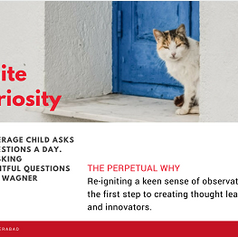The Next CV Ramans, Steve Jobs and Zuckerbergs
- Vijay Lakshmi

- Mar 4, 2018
- 5 min read

A Tie Hyderabad initiative encourages 7 qualities that foster Innovation and Entrepreneurship in kids. Following is the content of a blog write-up (and a presentation) done for TiE Hyderabad.
Most of us have lofty ambitions about the future of our children. We want our kids to become the next-gen Steve Jobs, Zuckerberg, CV Raman, Aryabhatta, Marie Curie or Kalpana Chawla.
But, rarely do we ask “how” or set out to do exactly “what” needs to be done to foster the spirit of innovation and entrepreneurship in children. As William Wordsworth said in My Heart Leaps Up, “The Child is the Father of Man,” it can’t be stressed enough how important it is to foster the qualities of child-like wonder, amazement, curiosity, creativity, imagination and scientific spirit, not just as kids, but throughout our lives.
Unfortunately, as parents and teachers, we rob children, at a very tender age at that, of these very qualities that are the foundations for innovation and entrepreneurship. We stop them from being curious or tinkering around stuff, and stop them from asking ‘why’ about everything.
So, how do we raise children to become the future inventors, creators, scientists, artists and founders of path-breaking innovations and successful entrepreneurial solutions to the world’s challenges?
(Click here to be inspired by 14 Indian scientists who changed the world)
7 Ways to Encourage Kids to become Dreamers and Doers:
Ignite Curiosity
Kindle Imagination
Encourage Creativity
Nurture Innovation
Support Collaboration
Cultivate Leadership
Foster Entrepreneurship
Ignite Curiosity
Parents and teachers tell children right from their toddler years ‘not to do this or that’ at every effort to discover and tinker around things. Kids are restrained from asking ‘why’ right from the time they go to school. “The average child asks 100 questions a day, and by the time a child is 10 or 12, he or she has figured out that it’s much more important to get right answers than to keep asking thoughtful questions,” reveals Tony Wagner’s bestseller ‘Creating Innovators: The Making of Young People Who will Change the World.’
Schooling and parenting, since the beginning of the 21st century, has narrowed down the definition of ‘success’ to mean learning by rote and acing repetitive standardized tests, thereby killing curiosity. Re-igniting a keen sense of observation is the first step to creating thought leaders and innovators. (Click here to know why it’s important to ask questions)
Kindle Imagination
The lack of curiosity leads to an absence of imagination. Albert Einstein said, “Logic will get you from A to B. Imagination will take you everywhere. ”Without leaps of imagination, there can’t be dreams and goals, or even possibilities. Gone are the days of experimenting in good old labs and breaking open radios, TVs, and playing with a mix of chemicals; curiosity is satiated rather by animated videos on the Internet explaining everything from gravity to outer Space.
Children are often told to ‘be real’ and imagination is only left to professionals pursuing liberal arts. Rekindling the flight of fancy and imagination in kids, is key to the functioning of creativity. (Click Here for an expert dialogue that discusses critical thinking and imagination)
Encourage Creativity
Creativity comes through a curious bent of mind and flights of imagination. Leonardo Da Vinci’s quote about his own life path can be applied universally to say that kids should be encouraged to search for answers to things they do not understand.
Creativity has taken a backseat to learning by rote. Fine arts and crafts are considered hobbies, rather than a pursuit of creative sciences. Humanities are treated like step-children in the order of all sciences. Encouraging creativity in children can happen only if imagination and curiosity are given their due significance. (Click here to read how Da Vinci’s creative breakthroughs are a result of his observation of the world around him)
Nurture Innovation
Steve Jobs and Bill Gates started their mega successful organizations from humble basements. Innovation wasn’t something they learnt at school. Schooling was only an avenue to gain knowledge. Innovation is a function of a creative bent of mind, curiosity, imagination and knowledge. Foster the reading habit in kids to help expand their knowledge base. Like Tony Wagner says, “What you really need for innovation is the ability to make connections between different kinds of expertise.”
Help children bring concepts to life and create specific answers to problems and issues. Encourage kids to observe the world with a keen eye, ask all kinds of questions, give flight to their fanciful ideas, give shape to their creativity, to discover solutions, invent products, and create innovative services. (Click here to know how creativity and innovation are crucial for success of an organization)
Support Collaboration
A key aspect of creating innovative solutions for world’s problems is collaborating with the key stakeholders. Children need to be encouraged to team up with family and friends to collaborate to bring their creative ideas to fruition. Collaboration makes kids more empathetic toward others. It encourages children to be open to suggestions when ideating solutions for problems. Kids learn to communicate openly with others, resolve conflicts, and manage tasks.
Studies say children who participate in group discussions create better reasoning for complex questions. Support your child’s collaborative projects, as it helps them develop leadership skills, gives them the courage to combine their passions with creativity and take risks while innovating. (Click here for the results of a survey done on a group work in class)
Cultivate Leadership
Which parent doesn’t want their kids to be great leaders, recognized and respected by one and all? Leadership comes from empowerment. Empower your children by encouraging them to be courageous, assertive about their intentions, stay true to their passion and inspire with confidence.
Inculcate and encourage your child’s Emotional Intelligence. According to TalentSmart, 90 percent of top-performing leaders have high EI. Maintain a sense of equanimity about both success and failure to teach children that life’s a mixed bag of achievements and letdowns. Thomas Edison was encouraged by his mother through his failed experiments, and this helped him become a successful inventor. (Click here for a few tips to teach leadership skills to children)
Foster Entrepreneurship
It’s sad but true that schooling, more often than not, kills entrepreneurial thinking. Some of the most successful entrepreneurs Mark Zuckerberg, Steve Jobs, Bill Gates, Richard Branson and Larry Ellison are college drop outs. Even the great Einstein wasn’t considered a normal child.
Fostering entrepreneurship is not how much knowledge is acquired, but how it’s applied through critical thinking, to create and innovate. Help children think independently, fearlessly, confidently, to stay positive, have a focused vision, and be passionate about innovating life-altering solutions to make this world a better place. (Click here for a list of qualities that make an entrepreneur)
(Images in PPT - Courtesy Canva, Pixabay and other free images-CreativeCommons sites)

























Comments